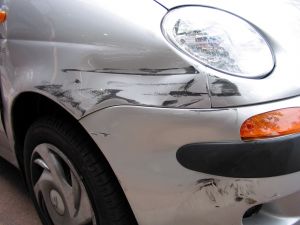 |
Collision is the portion of an auto insurance policy that specifically covers damages to your own vehicle. While collision insurance is not required by state insurance laws finance companies generally require you to insure for collision. Most finance companies will ask to be named as “lienholder” on your auto insurance policy for a financed car. Collision insurance isn’t required automobile insurance, but you may want the coverage to protect your car even if you have paid your loan off.
Collision insurance covers the damages to your vehicle in an automobile accident, when you are “at fault”. The standard collision automobile insurance policy will pay for any repairs up to the fair market value of your car. It is important to understand fair market value can be significantly lower than the cost of replacing your vehicle, or even the amount you owe on your loan. If your car is financed or leased, you will need to consider gap insurance so you can pay off the difference between what you owe and what the car is worth in the event of a total loss.
Collision coverage also includes a deductible in most cases. The deductible is an amount of money you will be required to pay first for any repairs. Once the deductible is paid the collision insurance will pay the balance up to fair market value. Most finance companies will require a set minimum for a collision deductible in order to be sure it can be paid in the event you have an accident. They don’t want to have a financed car with someone who can’t pay the deductible for damages they cause to the car they don’t actually own. Some finance companies will ask for no higher then $250.00 or $500.00 collision deductibles while other finance companies are able to consider your credit history and determine you can manage a higher deductible for a collision loss.
The higher the deductible you’re willing to pay, the less the collision insurance coverage will cost you in premiums. If you are in a financial situation and have a driving history with no at fault accidents, you might consider the highest deductible you can see yourself being able to afford.
Photo credit for this blog entry:  (no use restrictions for this photo)
(no use restrictions for this photo)
![]() Blogs In This Series: Auto Insurance Policies 101:
Blogs In This Series: Auto Insurance Policies 101:
- Liability Coverage
- Uninsured & Underinsured Motorist
- Medical Insurance & Personal Injury Protection
- Optional Coverage-Collision
- Optional Coverage-Comprehensive
- Optional Coverage-GAP
- Additional Auto Insurance Coverage
![]() Related Blogs:
Related Blogs:
Glossary of Insurance Terms:
A | B | C | D | E | F | G | H | I | J-K | L | M | N | O | P | Q-R | S | T | U-V | W-Z
Families.com Blogs are for informational purposes only. Families.com assumes no responsibility for consumer choices. Consumers are reminded that it is their responsibility to research their choices properly and speak to a certified insurance professional prior to making any decision as important as an insurance purchase.

